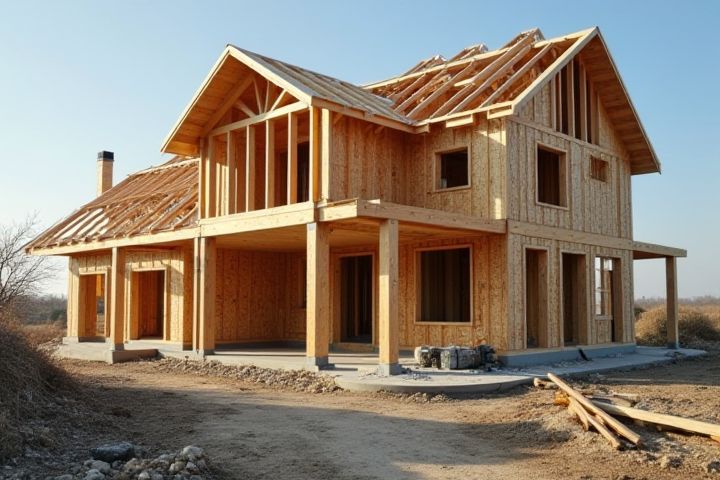
Living in a house during construction is possible but requires careful planning and consideration of safety and comfort. You should ensure that essential utilities, such as electricity, water, and heating, are functional to maintain a livable environment. Having a dedicated area free from construction debris helps create a safe space for you and your family. Communicating regularly with contractors about the construction schedule can minimize disruption and enhance your living experience. Prepare for potential noise and dust by taking measures to contain these elements in the areas under construction.
Can You Live In A House During Construction
Safety concerns
Living in a house during construction can pose significant safety concerns that require careful consideration. Dust and debris can affect air quality, leading to respiratory issues, especially for sensitive individuals; a mask is advisable in such environments. Open wiring and exposed tools increase the risk of electrical hazards and accidents; securing these areas is essential for your safety. Furthermore, construction sites may have restricted access, necessitating clear communication with workers to avoid accidents and ensure everyone's well-being.
Legal requirements
Living in a house during construction involves adhering to specific legal requirements, often governed by local building codes and zoning laws. In many jurisdictions, a permit is required for occupancy while construction is ongoing, ensuring safety standards are met. You might need to provide access to basic utilities such as water and electricity, as well as comply with safety regulations to minimize hazards. Failure to meet these legal obligations could result in fines or penalties from local authorities, making it essential to consult with your local building department prior to moving in.
Insurance implications
Living in a house during construction can significantly affect your insurance coverage. Homeowners might need to inform their insurance provider about ongoing renovations or constructions to maintain adequate protection, as standard policies often exclude liability or damage caused during such activities. This may necessitate obtaining builder's risk insurance to cover materials and labor, with premiums varying depending on the extent of renovations, often ranging from 1% to 4% of the total project cost. Ensure that your policy also includes coverage for personal belongings in the event of theft or damage, as living in a construction zone poses unique risks.
Noise levels
Living in a house during construction can significantly expose you to elevated noise levels, with sound reaching up to 100 decibels in some scenarios, particularly during heavy machinery operation. Continuous exposure to such high decibel levels can lead to increased stress and difficulty in concentrating on daily activities. It's important to assess the specific phases of construction, as demolition or framing can produce more disruptive sounds compared to quieter tasks like painting or electrical work. You can mitigate some noise by using soundproofing materials or earplugs, but understanding the expected noise levels and their potential impact is crucial for your comfort and well-being.
Dust and debris
Living in a house during construction exposes you to significant levels of dust and debris, which can impact both your health and comfort. Construction activities generate fine particles and hazardous materials that may invade living spaces, affecting indoor air quality. Implementing dust control measures, such as regularly sealing off construction zones and using air purifiers, can mitigate some of the adverse effects. If possible, consider minimizing your time spent in the affected areas to enhance your safety and well-being while the work is ongoing.
Utility disruptions
Living in a house during construction can often lead to significant utility disruptions. Typically, water, electricity, and internet services may be intermittently unavailable, impacting daily routines for you and your family. For example, water service might be turned off for several hours as plumbing is updated or replaced, while electrical outages can occur as circuits are modified. To mitigate these issues, homeowners should plan for essential service interruptions and consider temporary accommodations or alternative arrangements, particularly if major renovations are underway.
Limited accessibility
Living in a house during construction can lead to limited accessibility, impacting daily routines. You may encounter blocked doorways and restricted access to essential areas like kitchens and bathrooms, which could hinder your comfort and convenience. Construction projects often involve heavy machinery and tools, posing safety risks and noise disturbances that can make living conditions challenging. It's crucial to assess whether the ongoing work will significantly disrupt your lifestyle before deciding to reside on-site.
Privacy issues
Living in a house during construction can significantly impact your privacy. With workers and contractors frequently on-site, your personal spaces may become exposed to strangers, compromising your sense of security and comfort. If the construction involves extensive renovations or additions, the noise and disruption can further invade your private moments, making everyday activities difficult. To mitigate privacy concerns, consider using temporary barriers or scheduling work during specific hours to minimize disturbances.
Increased stress
Living in a house during construction can significantly increase your stress levels due to constant disruptions. The noise from heavy machinery and tools can disturb your daily routine, affecting your ability to concentrate or relax. Dust and debris may infiltrate your living spaces, leading to an uncomfortable environment that can impact both your physical and mental well-being. You might also experience heightened anxiety regarding the timeline, safety issues, and the overall chaos that construction brings to what is ideally your sanctuary.
Contractor communication
Living in a house during construction can present challenges, primarily depending on the extent of the work being done. Effective contractor communication is critical; establish clear expectations regarding project timelines, noise levels, and safety measures. Regular updates from the contractor, ideally through weekly meetings or progress reports, can keep you informed about changes and potential disruptions. Understanding the construction schedule helps you prepare for phases that may impact your daily routine, ensuring a smoother living experience.
